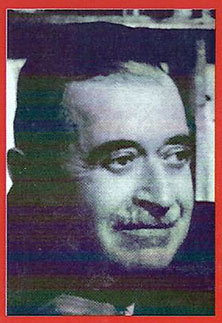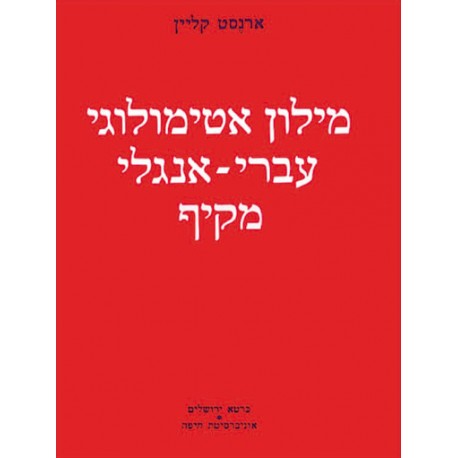אין מוצרים
המחירים כוללים מיסים
מילון אטימולוגי עברי-אנגלי מקיף
00427
מוצר חדש
עבודה תמציתית על מקורות המלים העבריות והתפתחותן.
***** אזל ****
לא ניתן לבחור מוצר זה
מידע נוסף
על ידי: ארנסט קליין עבודה תמציתית על מקורות המלים העבריות והתפתחותן.
***** אזל ****
- שפה עברי - אנגלי
היקף: 722 עמ'.
פורמט: 21x30 ס"מ.
כריכה קשה.
--------------------------------------------------------------------------------------------

ארנסט דייוויד קליין (1899-1983) נולד בשאטמר בחלק המזרחי של האימפריה האוסטרו-הונגרית (כיום רומניה). בשנת 1925 הוא זכה בתואר דוקטור לפילוסופיה באוניברסיטת וינה. תחומי ההתמחות שלו היו שפות וספרות שמיות, שפות רומנטיות וספרות ופילוסופיה. בשנת 1931 התמנה לרבה של נווה זמקה בצ'כוסלובקיה לשעבר. כאן הוא נשאר עד שגורש על ידי הנאצים במלחמת העולם השנייה, תחילה לאושוויץ ואחר כך למחנה הריכוז אלך-דכאו. הוא שוחרר על ידי חיילים אמריקאים בשנת 1945. אביו, אשתו, בנו היחיד ושתי משלוש אחיותיו נספו במחנות ההשמדה. לאחר השואה הוא חזר לעיר הולדתו, אך זמן קצר לאחר מכן נסע לפריס, ולבסוף עבר לקנדה בשנת 1951. כאן הצליח להתמסר לפרויקטים שהקים קודם לכן באירופה.
בעשרים השנים הבאות ד"ר קליין התמסר לחקר תולדות השפה האנגלית. מכיוון שבאנגלית יש שורשים בכארבעים שפות מדוברות ונכחדות, וקליין שלט בשפות אלה, הוא היה כשיר באופן ייחודי להרכיב את המילון האטימולוגי המקיף שלו לשפה האנגלית, שהיה הממצה ביותר מסוגו באותה תקופה. את עשר השנים הבאות לחייו הקדיש ל:
מילון אטימולוגי מקיף של שפת העברית לקוראי אנגלית
"קליין הוא המילון האטימולוגי הראשון במובן הנכון של העברית כמכלול .... הוא מיישם את חוקי הקול בקפדנות רבה ודן במקרים שישנם ספקות, או שבהם הוצעו יותר מאטימולוב אחד."
האוניברסיטה העברית חיים רבין
זהו כלי בעל ערך יוצא דופן עבור כל מי שעובד עם עברית, גם לבעלי ידע מינימלי בשפה. שכן הנה אנמולוגיות מפורטות של כ -30,000 מילים וצורות מילים - בנפח קל לשימוש ייחודי בהיקפו ובסמכותו.
הוכן על ידי המלומד והלקסיקוגרף הנודע ארנסט קליין, זהו קומפנדיום עשיר של ידע על מקורם, נגזרתם, וריאציותיהם של מרבית המילים העבריות, ומתחקה אחר ההיסטוריה של השפה על ידי זיהוי האופן בו אוצר המילים שלה השתנה, במשמעות ו בשימוש לאורך מאות שנים.
במילון זה מכסים היטב את אוצר המילים של העברית של ימינו; הנה גם המילים המקראיות, המשניות והרבניות המודיעות את השפה של ימינו, כמו גם מילים מימי הביניים שהיו בשימוש בתקופות קדומות יותר אך כבר לא בשימוש נכון כיום. קליין מזהה מילים שהושאלו או הכירו מתוך אכדית, ארמית, יוונית, ערבית ושאר השפות שהעשירו את אוצר המילים העברי.
כל מונח כניסה כולל הגדרה ברורה, תמציתית, ספציפית, כמו גם החלק של הדיבור או השכבה הלשונית ממנה הוא בא. המשמעויות השונות של מונח הכניסה רשומות ומספור ברציפות. המידע בסוגריים לזיהוי קל הוא המידע האטימולוגי עבור כל רשומה; ואז עקוב אחר הנגזרים, שרובם מופיעים כערכים נפרדים בספר.
המילון כולל עזרים שימושיים רבים למחקר, כולל מדריכים לתרגום יוונית, עברית וערבית; ומדריכים שלמים לקיצורים, סמלים ומקורות עזר המשמשים בספר. למעט מונחים עבריים, הספר הוא באנגלית; מילות קוגניציה ומקור משפות אחרות מועברות לתרגום לאנגלית.
בגלל ההיקף הרחב והמדע הקפדני שלו, זהו כלי עזר נחוץ מאוד, הוא יהיה בעל ערך לתלמידים, מורים, מלומדים, וקוראים וסופרים כלליים של העברית וספרותה; לאלה בלימודי המקרא, היהדות והמזרח הקרוב, כמו גם סטודנטים לספרות מקבילה, בלשנות היסטורית וסמנטיקה, ותחומי לימוד רבים אחרים. עבור מי שיש לו אהבה לשפה המתפתחת כל הזמן הזה, המילון יהווה מקור למידע ותובנה.
------------------------------------
Ernest David Klein (1899-1983) was bom in Szatmar in the eastern part of the Austro-Hungarian Empire (now Romania). In 1925 he earned the title of Doctor of Philosophy at the University of Vienna. His specialized fields were Semitic languages and literature, Romance languages and literature, and Philosophy.
In 1931 he became Rabbi of Nove Zamke in the former Czechoslovakia. Here he remained until deported by the Nazis in World War II, first to Auschwitz and later to the concentration camp Allach-Dachau. He was liberated by American troops in 1945. His father, wife, only son and two of his three sisters had perished in the extermination camps. After the Holocaust he returned to his birthplace, but shortly afterwards he went to Paris, and finally moved to Canada in 1951. Here he was able to devote himself to the projects he had started earlier in Europe.
For the next twenty years Dr. Klein devoted himself to the study of the history of the English language. Since English has roots in some forty spoken and extinct languages, and Klein had mastered these languages, he was uniquely qualified to compile his comprehensive etymological dictionary of the English language, which was the most exhaustive of its kind at the time. The next ten years of his life he devoted to:
A COMPREHENSIVE ETYMOLOGICAL DICTIONARY OF THE HEBREW LANGUAGE FOR READERS OF ENGLISH
“Klein’s is the first etymological dictionary in the proper sense of Hebrew as a totality.... It applies the sound-laws with great strictness and discusses cases where there are doubts, or where more than one etymology has been suggested.”
Haim Rabin Hebrew University
This is an exceptionally valuable tool for all who work with Hebrew, even those with a minimal knowledge of the language. For here are detailed etymologies of some 30,000 words and word forms—in an easy-to- use volume unique in scope and authority.
Prepared by the eminent language scholar and lexicographer Ernest Klein, this is a rich compendium of knowledge about the origin, derivation, and variations of most Hebrew words, it traces the history of the language by identifying the way its vocabulary has changed, in meaning and in usage, over the centuries.
In this dictionary, the vocabulary of present-day Hebrew is covered thoroughly; also here are the Biblical, Mishnaic, and Rabbinic words that inform today's language, as well as medieval words used in earlier periods but no longer in current use. Klein identifies borrowed or cognate words from Akkadian, Aramaic, Greek, Arabic and the other languages that have enriched the Hebrew vocabulary.
Each entry term includes a clear, concise, specific definition, as well as the part of speech or linguistic stratum from which it comes. The various meanings of the entry term are listed and numbered consecutively. Set off in brackets for easy identification is the etymological information for each entry; then follow the derivatives, most of which appear as separate entries in the book.
The dictionary features many useful aids to research, including guides for the translation of Greek, Hebrew, and Arabic; and complete guides to abbreviations, symbols and reference sources used in the book. With the exception of Hebrew terms, the book is in English; cognate and source words from other languages are transliterated and translated into English.
Because of its wide scope and its meticulous scholarship, this is a much-needed reference tool, ft will be valuable for students, teachers, scholars, and general readers and writers of Hebrew and its literature; for those in Biblical, Judaic, and Near Eastern studies, as well as students of conparative literature, historical linguistics and semantics, and many other fields of study. For those who have a love for this constantly developing language, the dictionary will be a source of information and insight.
ביקורות
אין עדיין חוות דעת של לקוחות.







